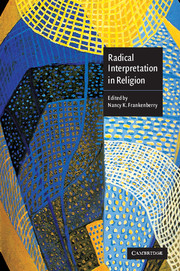Book contents
- Frontmatter
- Contents
- Notes on the contributors
- Preface
- Acknowledgments
- PART I PRAGMATICS
- PART II CULTURE AND COGNITION
- Introduction
- 5 “The Chinese believe in spirits”: belief and believing in the study of religion
- 6 On interpreting the world religiously
- 7 Are religious beliefs counter-intuitive?
- PART III SEMANTICS
- Select bibliography
- Index
5 - “The Chinese believe in spirits”: belief and believing in the study of religion
Published online by Cambridge University Press: 13 November 2009
- Frontmatter
- Contents
- Notes on the contributors
- Preface
- Acknowledgments
- PART I PRAGMATICS
- PART II CULTURE AND COGNITION
- Introduction
- 5 “The Chinese believe in spirits”: belief and believing in the study of religion
- 6 On interpreting the world religiously
- 7 Are religious beliefs counter-intuitive?
- PART III SEMANTICS
- Select bibliography
- Index
Summary
A recent round of books, both popular and scholarly, reveal that as a society we are, once again, fascinated with the issue of belief. While the more popular books tend to adopt a fairly straightforward and uncomplicated notion of believing and then find major problems of rationality, the more scholarly books readily accept a type of rationality to beliefs while problematizing the act of believing in other, more involuted ways. Both types of argument remind the scholar of religion that the academic discipline of religious studies has not contributed much to this discussion for quite a while. As described in Rodney Needham's 1972 work, Belief, Language and Experience, which was both a fulsome anthropological treatment of the problems and a cautionary tale for further studies, the concept of belief poses particular problems for comparative analysis since belief does not appear to be identifiable or similarly important in religions we want to compare and from which we want to abstract more general descriptions. Moreover, it is a commonplace that many of our assumptions about the centrality of belief in religion have emerged in a decidedly Christian context, making comparison a distortion of other religious views. Anthropological studies since Needham have tended to collapse belief into “culture,” which has worked well enough most of the time, but it not only avoids the explicit problem of why and how “beliefs” and “believing” become prominent in the way in which many people participate in a culture, it also retreats from the problem of various ways in which any one person may appropriate parts of the culture.
- Type
- Chapter
- Information
- Radical Interpretation in Religion , pp. 100 - 116Publisher: Cambridge University PressPrint publication year: 2002
- 17
- Cited by



